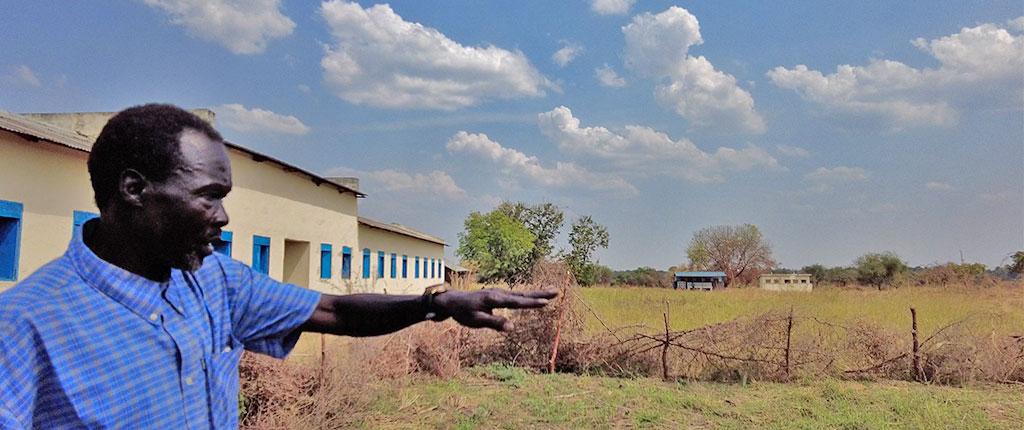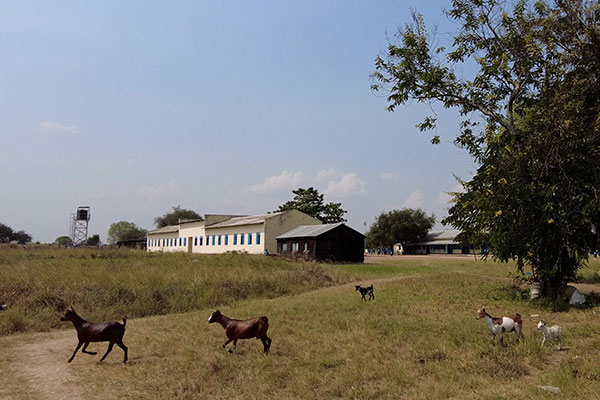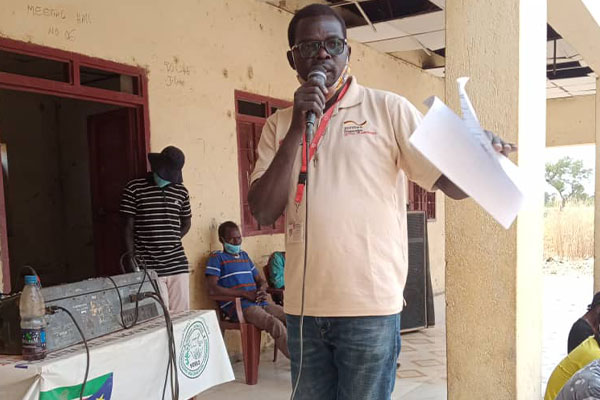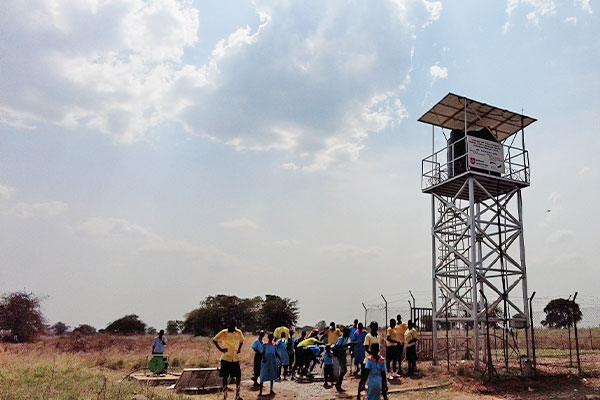
Conversation instead of fighting
Fences around the plots of land that farmers cultivate in South Sudan rarely exist in South Sudan. This is because the plots of land are often so large that the cost of a fence would be too high. And not all goats can be kept back by the simple thorn bushes that, for example, the headmaster of a primary school in Juba District put up around the school gardens. In Southern Sudan, this repeatedly leads to conflicts between pastoralists and farmers and, for some years now, to violent clashes. This is why we want to advance the work we are doing with our local partner organisation CARDO.

At first glimpse, everything seems perfect at Tokiman Community Primary School in Rejaf Payam. The children run noisily through the schoolyard, classes have just ended for the day. But when our colleague Rume William Kenyi enters the dark room of the headmaster on this hot day, he is upset: "We need new fences for the school gardens! The fence we built doesn't help at all. The goats just jump over it at night and eat everything bare."
Mathedio Gubek Sanfino is enraged. Behind the Tokiman Community Primary School, he and the teaching staff have converted two plots of land into school gardens. The land is irrigated by a solar-powered pump. Actually, they should start removing the weeds and planting the new seeds that our staff brought with them next week. But this makes no sense, says Mr Sanfino, because the goats would eat everything up again if there is no new fence. At the moment, a temporary fence made of thorny bushes surrounds the gardens. Too low, Sanfino says. The fence is no obstacle for the goats. Even now, dozens of goats roam the schoolyard, stop in front of the classrooms and are not bothered by the noisy children.
Many people lose their lives every year due to violent clashes

The conflict with the school's neighbours, who let their goats roam free, is a symbol of what repeatedly leads to disputes and violent conflicts throughout Southern Sudan: One group needs the land to farm, the other group needs it for their livestock. It often happens that cattle breeders let their herd of several hundred animals graze on other people's land and fields cultivated by farmers are eaten up in the process. Since the farmers' livelihoods are at stake here, the situation can escalate quickly. In South Sudan, many people now own weapons and armed conflicts occur again and again. Every year, many people lose their lives in this way.
Orasio Opiyo is the director of the South Sudanese organisation CARDO, with which we have been working since May 2021. The organisation has been addressing precisely this problem in their country: the violent clashes between farmers and pastoralists. "These two groups used to live together peacefully here. But since the civil war broke out in 2013, the conflicts are often violent. The habitable space that is not affected by drought or flooding is becoming smaller and many people are also being driven from their homes because of the violence of the rival armed groups and have to settle in new areas. But of course other South Sudanese already live there and these people then suddenly compete for land," Opiyo explains.
Local peace work brings hope

Talking instead of fighting is how CARDO wants to solve one of the main problems in South Sudan. "We bring people together, both different civil groups and politicians. Everyone sits down at a table and discusses the problems. Then, among other things, compensation payments are agreed for crops that have been eaten away and animals that have been killed. This is how the South Sudanese used to resolve disputes, and we help them get back to those roots," says Opiyo. It is also important here that the agreements are transmitted to the remotest villages. This is difficult to do in a country like South Sudan with poor infrastructure. That is why we have distributed 500 solar-powered radios to families in local communities.
So far, the peace-building project we support is limited to the three South Sudanese states of Western Bahr el Ghazal, Warrap and Gogrial. But that is about to change. We want to expand our work with CARDO. "I definitely have hope for this country, because people always manage to build something new for themselves. But this will only work on the long run if there is peace," says Michael Fuchs, Malteser International's office manager in Wau.
For the director of the Tokiman Community Primary School in Rajaf Payam near the capital Juba, it is clear: the only thing that can protect the two school gardens from the goats is a higher fence over which they can no longer jump at night. That is what our staff member Rume William Kenyi now wants to take care of. However, school director Sanfino is quite satisfied with the water supply, the latrines for the pupils and the teaching staff that we have installed. He would definitely like to add that.








